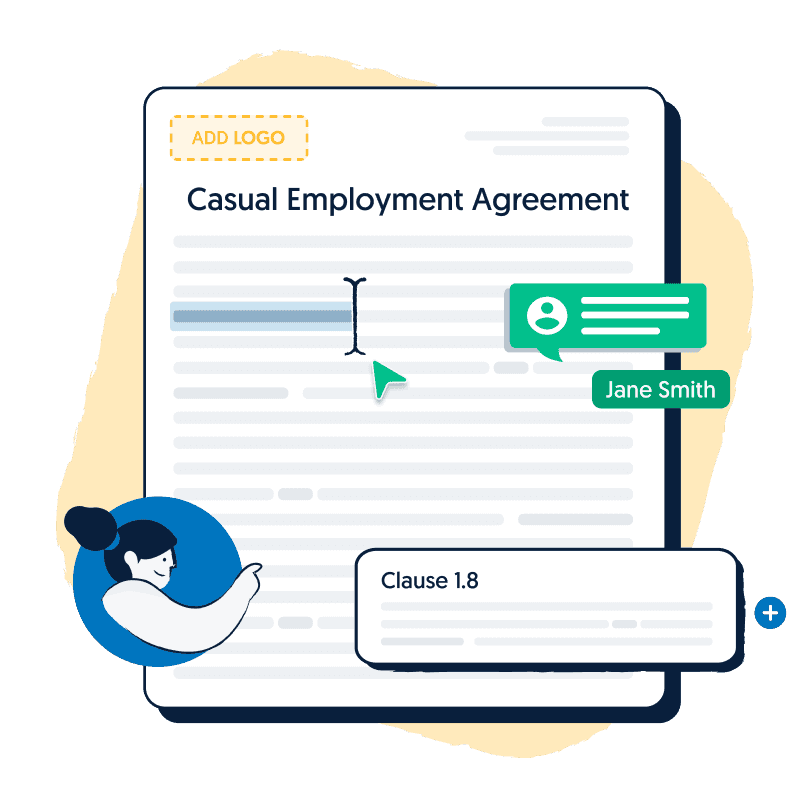Have you ever wondered what casual loading means? This is a term commonly used when describing the pay of a casual employee.
In this article, we define the term casual loading, what a casual employee is, how casual loading can be applied to casual employees’ pay, and answers to other frequently asked questions.
Read along!
What does Casual Loading mean?
Casual loading refers to the additional payment casual employees receive per hour. The amount of casual loading a casual employee receives generally depends on the awards and agreements that apply to their position. Generally, the casual loading rate that applies to a casual employee’s regular hourly rate is 15-25%.
As an employer, it’s crucial to know the difference between casual employment, part-time employment and full-time employment. This is because employees are entitled to different rights on the basis of their employment, such as higher pay or leave.
As an employer, you should be aware of when you’re required to pay casual loading to your employees. This is because if you fail to pay casual loading when you’re required to do so, you may breach the casual employee’s employment agreement. Therefore, you should always look at the relevant awards and agreements when hiring new employees.
This will prevent any confusion or mistakes from occurring when you’re paying your employees. Additionally, you’re required to inform employees regarding whether they’re employed on a permanent or casual basis.

Get your Casual Employment Agreement now for free.
Hire casual employees in any industry. This Employment Agreement (Casual) is essential when hiring new employees for your business.
How much casual loading needs to be paid?
The casual loading rate an employee is entitled to depend on many factors. According to the Australian Government’s Fair Work Ombudsman, a casual employee that receives the national minimum wage is entitled to receive a casual loading of 25%.
Where a casual employee is not covered by any award or agreement, the casual loading rate that applies to them is the rate contained in the Miscellaneous Award. The rate that applies pursuant to part 11.1 of the Miscellaneous Award is 25% of the minimum hourly rate.
Casual Loading in New South Wales (NSW)
The general casual loading rate for casual employees in NSW is 25%. This rate may vary on the basis of an individual’s employment contract, enterprise agreement or award. You can use the Fair Work Ombudsman’s pay calculator to determine how much you should be being paid.
Casual Loading in Queensland(QLD)
Similarly to NSW, the casual loading rate that casual employees are generally entitled to is 25%.
A person’s employment contract, enterprise agreement, or award may affect this rate.
Casual Loading in Western Australia (WA)
Like NSW and QLD, the casual loading rate that is generally applied to the pay of casual employees is 25%. If you’re a casual employee in Western Australia, the casual loading rate you will receive will generally be determined by either the state labour relation system or the federal system. The casual loading rate that will apply to your payment can also depend on your field of work.
The WA state minimum wage is currently $21.58 an hour, and as of July 2022, a 20% casual loading rate will be applied to this hourly rate therefore, adult casual employees will be paid at an hourly rate of $25.89.
Casual employees who are within the system have the WA award applied to them. If you would like to receive further information regarding your pay rate, you can contact the Government of Western Australia’s Wageline.
In WA, the Fair Work Commission determines the casual loading rate that casual employees are entitled to when they’re covered by Australia’s national workplace relations system.
Who is a casual employee?
The definition of a casual employee is contained in Section 15A of the Fair Work Act 2009. This section states that a casual employee is a person who has signed and accepted an employment contract from their employer with the knowledge that there isn’t a firm advance commitment to continuing and ongoing work in accordance with an agreed pattern of work.
The following characteristics are common for employees who are employed on a casual basis:
- Casual employees generally don’t work for a set period of time
- Their working hours and days are subject to change
- They generally don’t have a fixed position in their workplace
- They’re not obligated to come to work when they’re called in
- The work rosters of casual employees are generally always changing
- Casual employees are allowed to swap shifts with other employees and give away their shifts to other employees
- Casually employees generally don’t have fixed working hours
- Casual employees aren’t entitled to some leave entitlements such as paid sick or annual leave
- Casual employees aren’t required to provide notice when they’re resigning from their position. However, this can change depending on what the registered awards and agreements say
- Casual workers generally receive more pay than individuals who are in permanent employment
Who is a long-term casual employee?
Long-term casual employees are casual employees who have worked for their employer for a long period of time. When a casual employee becomes a long-term casual employee, they may start receiving more work and regular working hours. Generally, a casual employee has to regularly work for an employer for 12 months to be considered a long-term casual employee.
However, it’s important to note that long-term casual employees are still considered casual employees and are therefore still entitled to the same benefits as other casual employees, such as casual loading.
Long-term casual employees can sometimes become part-time or full-time employees. However, there needs to be an agreement between the employer and employee for this to occur. Most awards will outline this conversion process.
Other entitlements long-term casual employees are provided with is long-service leave in certain states or territories. Furthermore, they’re also entitled to unpaid parental leave and are allowed to ask for flexible working hours.
What is the difference between a casual employee and full-time or part-time permanent employees?
Full-time and part-time employees have fixed-term employment agreements. They work regular hours and are provided with a number of entitlements that casual employees aren’t entitled such as paid sick leave, annual leave and redundancy pay. Additionally, permanent employees are required to provide notice to their employers when they’re resigning, and they’re also entitled to be provided with a notice of termination from their employers.
What benefits do casual employees receive?
The primary benefit that casual employees receive is casual loading. Additionally, they’re provided with several entitlements under the National Employment Standards( NES), these include the following:
- Casual employees are provided with the opportunity for casual conversion, which means that they can become permanent employees. Casual conversion is generally offered to casual employees after they have worked for their employer for a period of 12 months.
- 5 days of unpaid family and domestic violence leave (per each 12-month period of employment)
- 2 days of unpaid carer’s leave
- 2 days of unpaid compassionate leave per situation
- Unpaid community service leave
- Casual employers are provided with the casual employment information statement and the Fair Work Information Statement
Conclusion
In summary, all casual employees are entitled to casual loading, and the rate they will be paid will range from 15-25% of their regular hourly rate.
As an employer, you should make sure you’re paying your employees the correct casual loading rate to avoid legal consequences.
If you’re a casual employee and are still unsure about how the amount of casual loading you’re entitled to, or if you’re an employer and are unsure about how much casual loading you’re required to pay your casual employees, you should hire a lawyer for legal advice.

Get a fixed-fee quote from Australia's largest lawyer marketplace.






